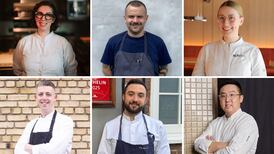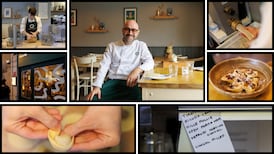In Nonnas, Vince Vaughn plays Joe Scaravella, a man who finds his way back to life by cooking with Italian grandmothers – a story drawn from the real Enoteca Maria in Staten Island. It could sound sentimental, until you scroll through Lucy Cafe’s Instagram and see three Ukrainian grandmothers folding dumplings and shaping pancakes at a high counter on Upper Clanbrassil Street. They make more than 1,500 varenyky each week – every motion a small act of remembrance, their hands moving with the same rhythm they learned half a century ago.
The recipes come from another grandmother – Lucy, or Lyudmyla – whose name the cafe carries. She was the woman who raised co-owner Mykola Kuleshov after his parents died, the source of the cooking and, in a way, of the place itself. Mykola is the chef; his wife, Viktoriia Horbonos, manages the restaurant, moving between tables, chatting about dishes shaped from his grandmother’s notes.
Before moving to Ireland, she worked as head of international co-operation at Ukraine’s state forensic service, holds a PhD in law and later taught at university. Mykola spent years at sea before returning to cook professionally. They came to Dublin in 2023, carrying memories, recipes and a few pieces of crockery from their homeland. The war broke the life they knew – so they built another.
At first glance, the food seems simple. A bowl of deep crimson broth arrives, Odesa-style borscht (€9), its surface catching the light like a dark ruby. It’s almost clear, holding its sweetness without heaviness. You can taste the order of its making: vegetables diced, beetroot simmered, the slow patience of broth. Beside it sits the pyrizhky (€4.50), a soft bun brushed with garlic butter, served with sour cream and a thin slice of salo (pork lard). It’s astonishingly good – light and warm, with a touch of sweetness. When you tear the bread, the smell of yeast and garlic rises. It absorbs the soup’s heat; the cream enriches it. It’s a bowl that could feed grief or joy with equal grace.
READ MORE
Then the grandmothers’ dumplings – varenyky (€14) – bright green dough scented with spinach, wrapped around a filling of tvaroh (a fresh curd cheese) and spinach, glistening with butter and mushrooms cooked till nutty. They’re often mistaken for pierogi, but the dough here is richer, made with egg and rolled a little thicker.
Next come the deruny (€14) – golden, crisp-edged potato pancakes served in a neat fan across the plate – five in total, each evenly browned; delicately crunchy outside, yielding to a soft, fluffy interior. Hearty and simple. With a forkful of bacon and cream, they taste like comfort written in another language.
Holubtsi (€18) are stuffed cabbage rolls. The pale jade leaves – ribbed and veined with the natural grain of cabbage – are soft and translucent, filled with a mix of rice and minced chicken. A tomato sauce the colour of rusted copper is spooned over and pools in the bowl, soon turning pale amber with a swirl of cream. They taste like something from a kitchen where nothing is wasted and time is the secret ingredient.
The Kyiv (€19) follows, looking deceptively simple. So often heavy and shrill with garlic, here it’s light, golden, almost restrained. Instead of a solid fillet, the chicken is minced, shaped into a rugby-ball oval, dipped in panko and fried to a delicate crust. Cut through and the dill butter runs freely – the hallmark of an authentic Kyivska kotleta – pooling against the gloriously buttery mash. I find myself thinking how good it would be with the deeper flavour of thigh meat and the firmer texture of unminced chicken, though the balance here is hard to fault.
There’s no wine list yet – the licence is still pending – but the soft drinks are chosen with care: Kvass (€4.50), a fermented bread drink, and a zero-alcohol mulled wine (€6), work nicely with our meal.
Dessert begins with medovyk (€7), a delicious honey cake, 14 layers of dough, each topped with sour-cream frosting made with honey from Dublin beekeeper Orla Devane. Then syrnyk (€6), a cheesy babka made from Ukrainian curd cheese and raisins under a dark sheen of chocolate.
It’s easy to forget that this café didn’t exist two years ago – that the people who run it once lived entirely different lives. What they cook now is simply what they know best. Eating here feels less like discovering a restaurant and more like being embraced into a family. The room is small, but it holds entire histories – loss, migration, love – all transmuted into flavour.
Dinner for two with two drinks was €102.
The verdict: Like discovering a restaurant and being embraced into a family
Food provenance: Fresh farm vegetables (Ukrainian varieties of cabbage and cucumber), Sysco chicken (not free-range), and Orla Devane honey
Vegetarian options: Pyrizhky (buns), borscht, cheesy and potato pancakes
Wheelchair access: Fully accessible with an accessible toilet
Music: Low, background












